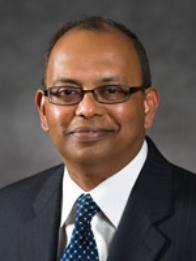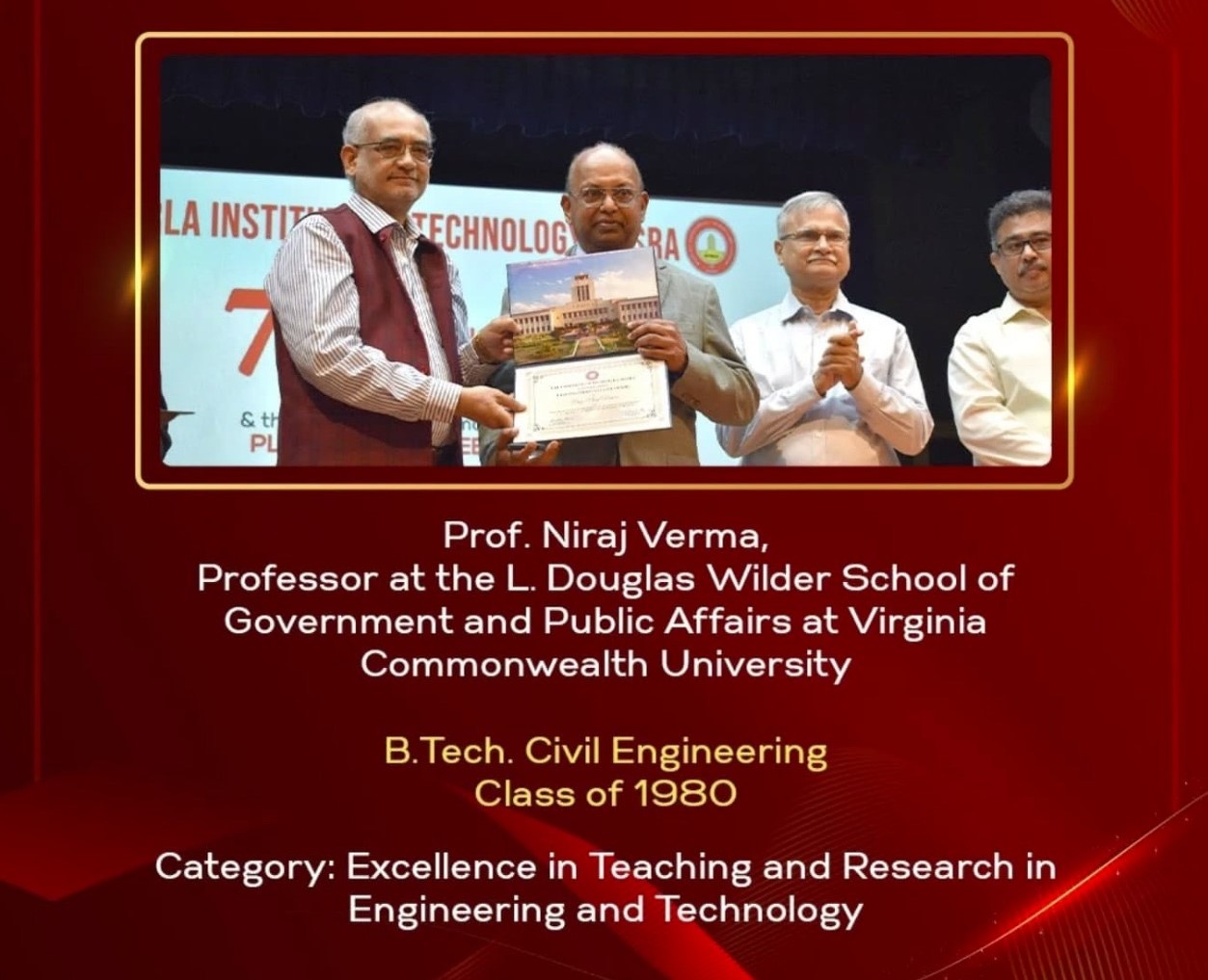
Niraj Verma, PhD., professor of urban and regional planning at the VCU Wilder School, is the recipient of the 2025 Distinguished Alumnus Award for 'Excellence in Teaching and Research in Engineering and Technology.’
The Birla Institute of Technology (BIT) Mesra Distinguished Alumnus Award was instituted by BIT Mesra (Ranchi), India to recognize and honor alumni who have brought laurels to their alma mater by making significant and outstanding contributions to their profession, businesses and society.
Professor Niraj Verma’s contributions span more than 40 years and combine engineering and technology in urban planning, institutional analysis and public management.
“This award, for me, means that someone interested in leveraging their engineering skills to perform in other fields, such as urban planning, management or institutions, can see that it is a worthwhile task,” said Verma. “One doesn't have to keep blinders on, only seeing a career in terms of their undergraduate discipline.”
Verma acknowledged that in some countries, like India, transitioning between careers is more academically challenging than in America. He feels that American philosophy, specifically American pragmatism and the teachings of William James and Charles Peirce, who was known as “the father of pragmatism,” may have some correlation to this. American pragmatism also serves as a guiding force for his research, pushing him to theorize and facilitate new ideas.
Theory by design
“My work is formally classified as planning theory in management,” explained Verma. “Sometimes it’s called organizational or management theory. In design, it's design theory, which looks at the processes behind some of these activities and thinks about them in a systematic way.”
Verma’s research focuses on crucial aspects that are frequently overlooked when establishing systems and institutions. For example, a significant portion of urban planning focuses on transportation safety. Civil and roadway engineers work together to ensure road safety, but Verma considers a spectrum of end users and constituents, ” like Mothers Against Drunk Driving, an organization that has a fundamental influence on who is on the motorways because of their staunch advocacy for stronger laws surrounding drunk drivers, drugged drivers, and underage drinking.
“That's how I think of my work today: using ideas that have been left over, marginalized or discarded and trying to see if reintegrating them into the research enterprise in a systematic way helps power our thinking better and makes our solutions more comprehensive.”
– Niraj Verma
This approach aligns with the core principles of American pragmatism, which emphasizes considering alternative solutions when approaching problems. Pragmatism asks what something means and says that the meaning of any idea, program or project is in the transformation it promotes.
“If you have a great idea, but it doesn't make a difference, it's not only a poor idea but a meaningless idea, which is a far more devastating critique than to say that an idea has limited use.”
Launching the Wilder School
Verma believes this thought process of societal betterment was the foundation for establishing an institution like the VCU Wilder School. He served as the school’s director and the first dean from 2010 to 2016. This role enabled him to further develop his research interests in institutions and their potential for transformation. Under his leadership, the Wilder School became a standalone school, formerly a part of the College of Humanities and Sciences.
In collaboration with Governor L. Douglas Wilder, VCU president Michael Rao, provost Beverly Warren and faculty, Verma oversaw the onboarding of 25 new faculty members, established new development and communication offices, and introduced student advisement and student welfare services. In 2016, Verma then stepped down to return to a teaching career.
“I found that I loved teaching,” said Verma. “I also wanted to help improve and build the doctoral program.”
A diversity of experiences
Prior to joining VCU, he began post-undergraduate life as an engineer in training at Tata Steel, India’s largest corporate entity and a leader in steel production. He then pursued a master’s degree in infrastructure planning in Stuttgart, Germany, where he met influential professors, including C.E. Rittel. “I was able to do quite a bit there, but then I realized that I was not learning much more,” said Verma. “That was the time when I started looking at Ph.D. programs and decided to come to the United States.”
He chose the University of California, Berkeley to continue his work with professor Rittel in design theories and methods. After UCBerkeley, he accepted his first academic job at the University of Southern California, where he spearheaded doctoral programs, developed his first research agenda on the idea of connections and similarities, and published his first book, Similarities, Connections, Systems: The Search for a New Rationality for Planning and Management.
Before being recruited by VCU, the University of Buffalo appointed Verma as chair of their urban and regional planning department. There he supported the establishment of another doctoral program, and found his love for building within academia.
“It helped teach me about myself, that I love this aspect of academic administration that involves building things and institutions.” This newfound passion equipped him with the necessary tools as director and dean at VCU, a time he describes as one of his biggest, and most rewarding challenges.
Overcoming challenges
Early on in his career, Verma was challenged with carving out a niche for himself in a competitive environment. His interest was theory but many at the time of graduation told him there were no jobs in theory. After Berkeley, the question became, ‘What now?’ Graduating in 1991, with immigration restrictions during a bleak time for the American economy, he confronted employment difficulties, but eventually found a new home at USC.
Verma recounts that perhaps his biggest challenge was his responsibility to make the Wilder School a standalone school. At the time Verma joined VCU, the university’s upward trajectory brought a great deal of change. He was fully aware that change makes people uncomfortable. His primary task became how to bring existing faculty on board with organizational change while additionally recruiting new talent that would exceed expectations. Thankfully, Verma’s philosophy of pragmaticism made this process fruitful.
The impact of research
Verma has different views on how he hopes his research touches disciplines across academia and society. In engineering, Verma can point to water tanks, for example, and say”‘I designed that. But through urban planning and management, he believes the primary ways in which he’s made impacts are through the work his students carry out in their fields.
“We train an army of people with master's degrees in urban planning who go out into the community and help create change. In that short time that they're here, our job as professors are to give them the values that will stay with them for the rest of their career.”
One example he gives is of a student from Korea he worked closely on theorization with at USC, who knew little English but eventually became a professor at Seoul National University, the top university in South Korea.
Verma also hopes that his numerous published books and articles will inspire colleagues to continue expanding upon his research at a pragmatic level.
“When colleagues think about American pragmatism in planning, there are five to six influential people that come to mind, " said Verma. “I hope to be part of that small but special group now and in the future.”



.jpg)